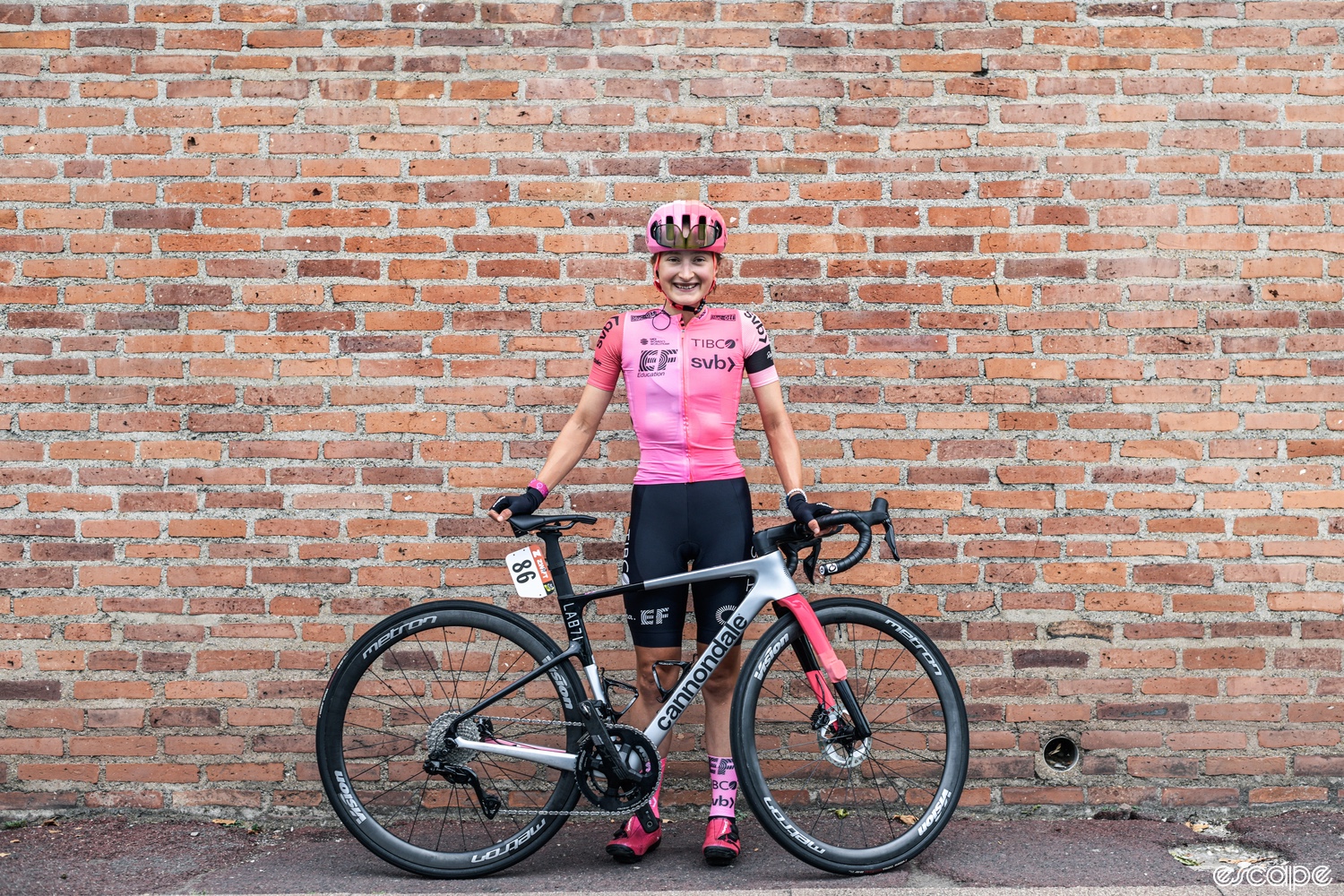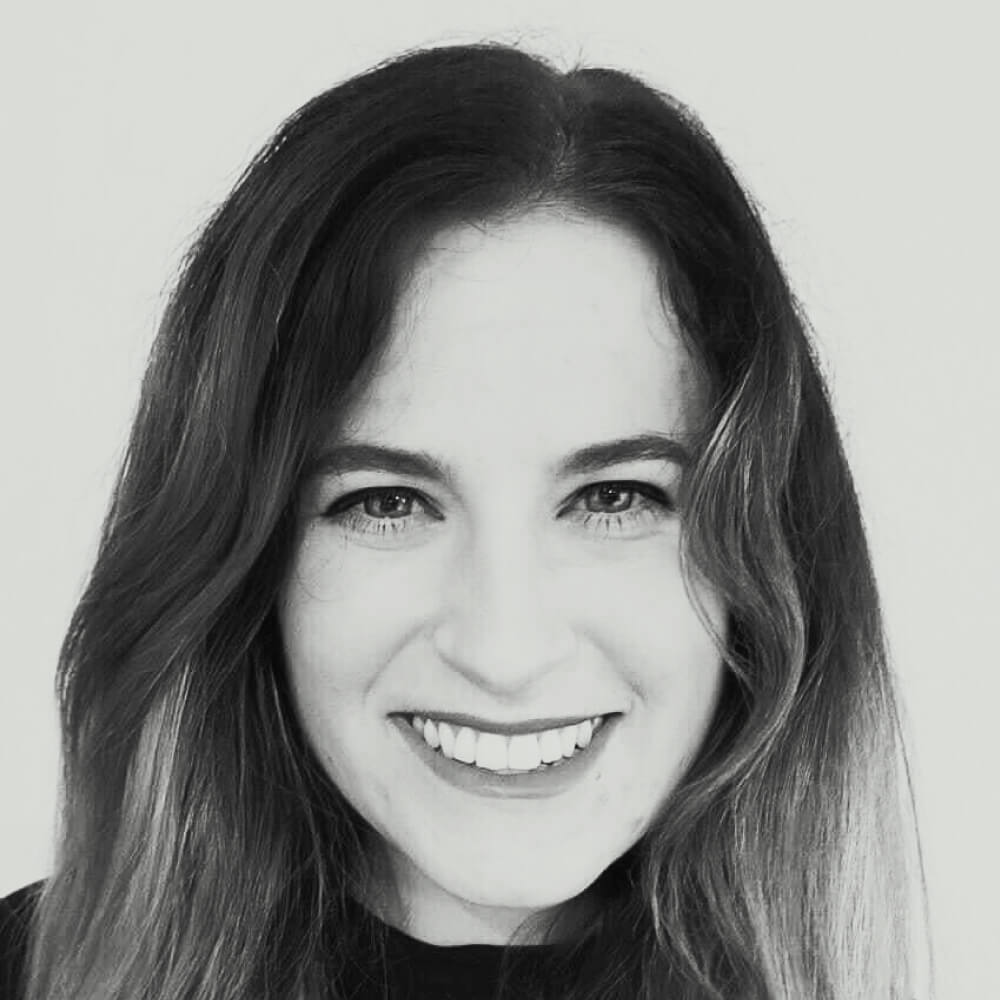It’s no secret that for those trying to get into professional cycling from, well, anywhere outside of Europe, the road is a little tricky to navigate. For Canadian Magdeleine Vallieres Mill, or Mags to her teammates, a path fell into place via the UCI’s World Cycling Center to ride for EF Education-TIBCO-SVB in 2022. Powered by her own maple syrup, Vallieres quickly gained the reputation of a selfless worker, thinking of her team before herself, and dreaming of someday earning the chance to take on the Ardennes Classics.
“I think I am not yet at the level to be something more than [a domestique],” Vallieres told Escape Collective. “Maybe if I get the opportunity sometime then yeah, but I like my position at the moment and it helps me grow and get stronger. I need to get stronger to have another role. So someday, maybe.”
Vallieres’s content as a domestique is partly thanks to her laid-back personality. She’s loyal and kind of quiet until she cracks a one-liner that has the whole bus in hysterics. Not that she isn’t ambitious – it’s a prerequisite to any athletic career – but Vallieres enjoys taking things one step at a time, she’s in no hurry to have leadership duties.
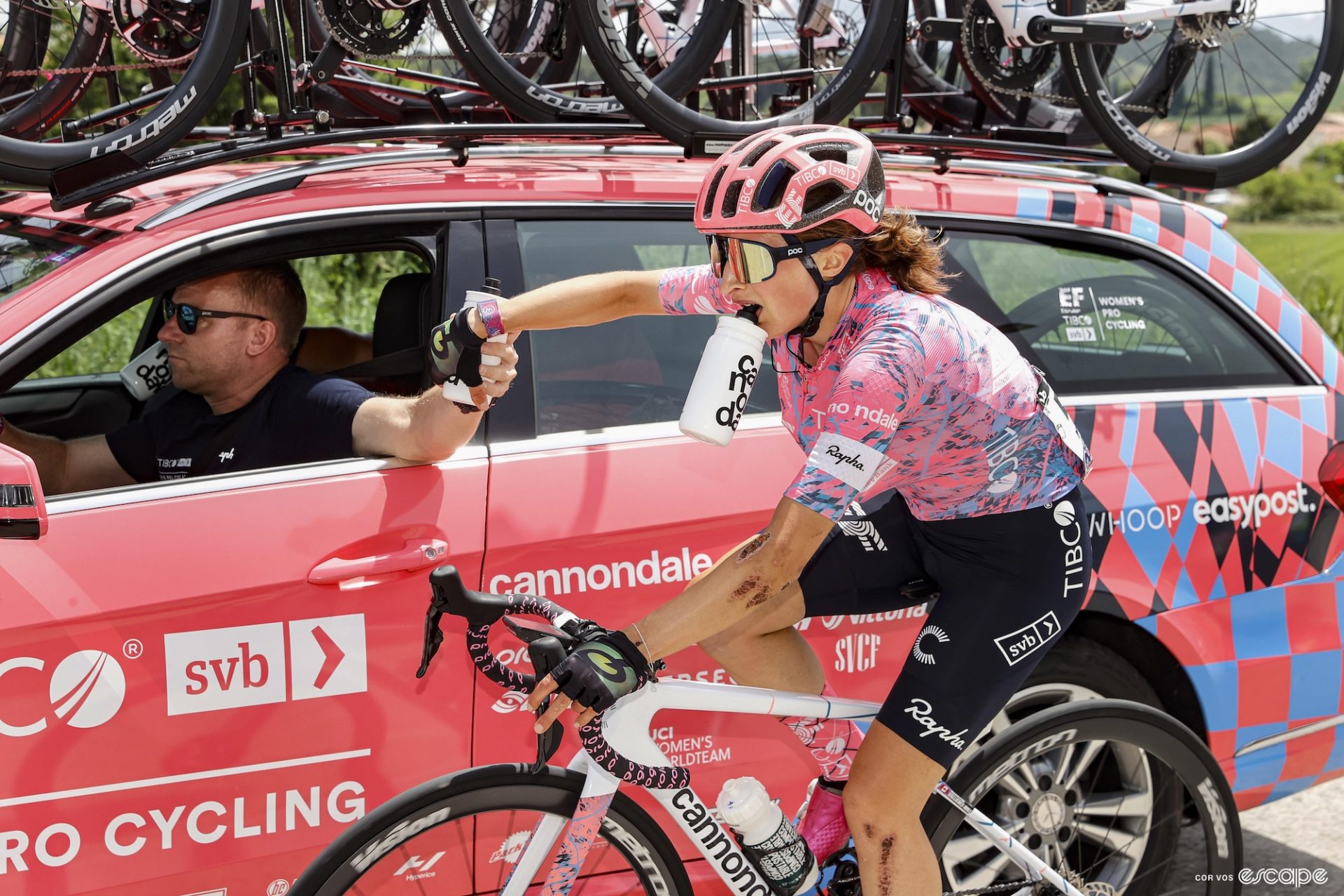
Vallieres’s relationship with cycling started when she was nine: her dad had a “bit of a crazy” idea to ride 1,000 km to visit her mom. The trip could have swayed her relationship with cycling for good or ill; imagine a nine-year-old riding 1,000 km in nine days.
“We took a bike and took off the little wheels and put some baggage in the back on the rack, and yeah, we did 1,000 km of bikepacking,” Vallieres recalled with a slight giggle. “That’s how I started. We did it in nine days, and when I think about it, I think it was a bit of a crazy idea, but I mean, this is how I fell in love with the sport.
“I was either I was gonna hate it, or I was gonna love it.”
Upon their return home Vallieres told her father she was in love with cycling and wanted to do more, so they signed her up for a club in her hometown where she could ride a bit with other people. The experience actually pushed her away from road cycling and into cyclocross.
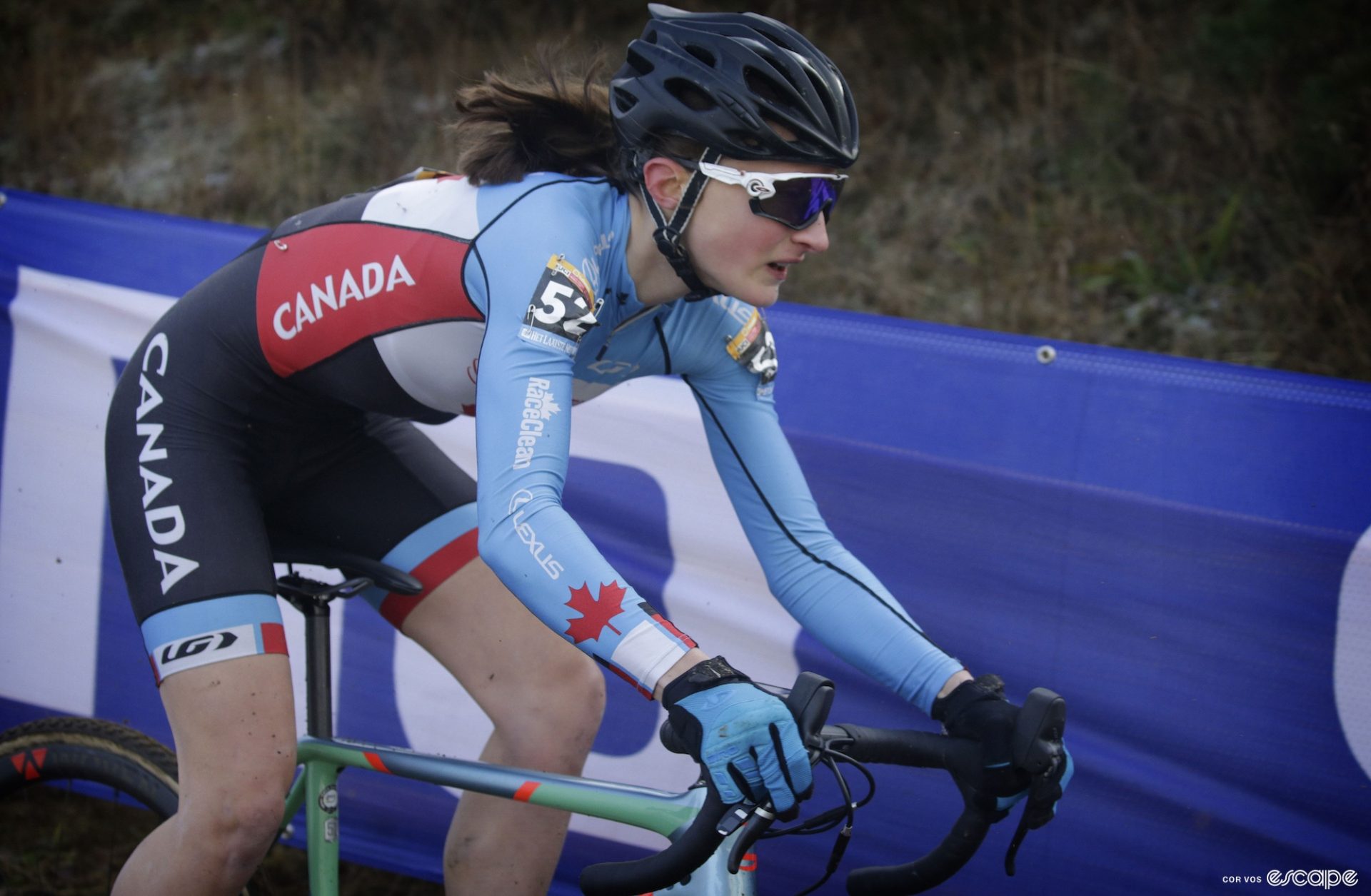
“I got a little bit less hooked on road cycling. [After that] it took a couple of years,” Vallieres explained.
“I tried cyclocross for a little bit, and then I started racing cyclocross, which I liked a lot. But, at some point, when I was maybe 16 or 15, I did a road race and I liked it, then slowly built from there.”
Typically, after discovering the unhinged world of cycling outside of Europe, it takes many years of riding for a North American team – that if you’re lucky makes some trips to Europe – or flying over with the Canadian national team for some events, but for Vallieres her story went a different way. She skipped over any North American teams and went straight into the World Cycling Center program in Aigle, Switzerland, where she raced for two years.
“After the World Championship in 2019, my last year junior, I still didn’t have a team for the next year and I got this offer to go to [Switzerland] to do some testing to see if I could get on the [World Cycling Center team] for the next year,” Vallieres said. “My dream was to race in Europe, so I was like, ‘Oh, I need to go there.’ So I went and did the testing and they offered me a contract..”
The experience, albeit different from a regular team, was exactly what Vallieres wanted and needed. She wanted to race in Europe, and suddenly there she was, living in Switzerland. “This is what I wanted to do to race in Europe and get experience. So yeah, it ended up being perfect,” she said.
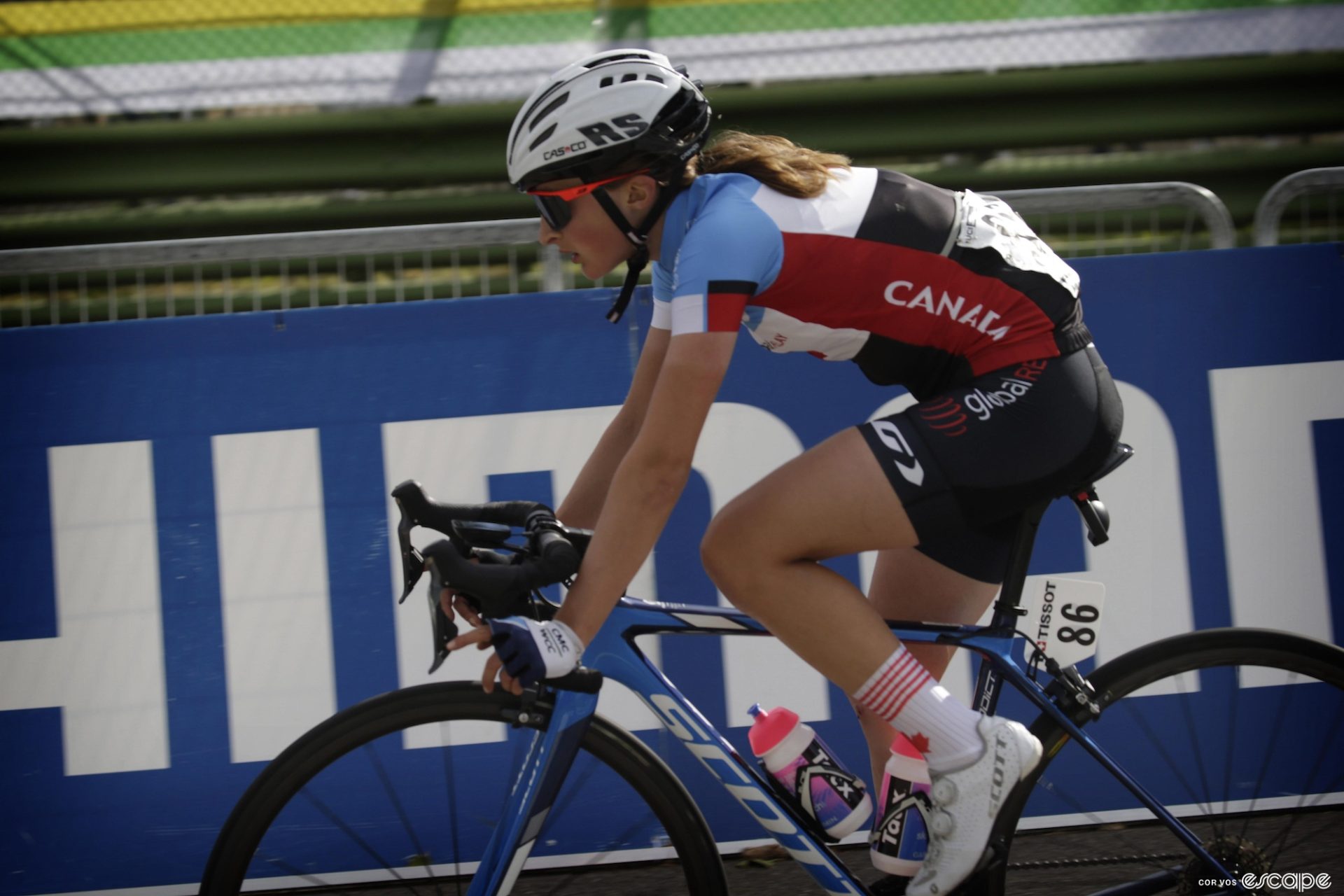
Looking at her trajectory, Vallieres is aware she didn’t take the standard path. On EF Education-TIBCO-SVB she was teammates with riders like Sara Poidevin who went the regular route. (Sara rode for Rally, now Human Powered Health, for a number of years. Eventually they took her over to Europe and when the team went WorldTour Sara joined EF Education-TIBCO-SVB.)
“There are not that many teams that go from North America to Europe,” Vallieres said. “Also, you still need a place to stay when you get there. [On WCC team] we had a residence where we all lived together. And so yeah, it was really good.”
The two years she spent with the WCC team were like a two-year training camp. She spent the vast majority of her time with her teammates and coaches as everyone lives in the same place. Before each daily ride she would ride a city bike to the center and start her training from there, often with teammates all of whom were from different countries.
But after two years she was ready for the next step up. Vallieres contacted teams, hoping to make that move. Quite quickly she heard back from TIBCO-SVB, but at the time she didn’t know they had plans to go WorldTour.
” I didn’t know they were going to be WorldTour [with EF Education First] when I started talking with them, and then when I realized it was like, ‘Oh my god, this is my dream coming true.’ Then I was talking to Linda [Jackson, the founder and general manager] and Rachel [Hedderman, sports director] and yeah, I ended up getting an offer, which I definitely accepted.”
It was a dream come true, to race on a WorldTour team, but in a lot of ways it was even better than Vallieres had hoped. Not only was she on the elite side of the sport, getting ready to line up for the Giro Donne and the Tour de France Femmes avec Zwift, she was on a team that felt like a bit of home, after two years living very far from southern Quebec.
You see, there are a lot of Canadians on EF Education-TIBCO-SVB.
“We always talk about maple syrup,” Vallieres admitted. “The maple syrup here is not so good. So I always bring mine with me. But then, with AJ, Alison Jackson, we do some dance moves and, ya know, it’s just nice to have other Canadians that like, know the same things.”
“It’s a really nice team and feels a bit like a family in some ways. I got to do so many nice races that I always wanted to do. So, yeah, I’ve been super lucky.”
When prodded about the maple syrup thing Vallieres explained that she is quite picky about her supply. It’s not just that she doesn’t like the maple syrup you can find in niche shops around Girona, where she lives during the season, she specifically only consumes her maple syrup. Like, that her family made themselves.
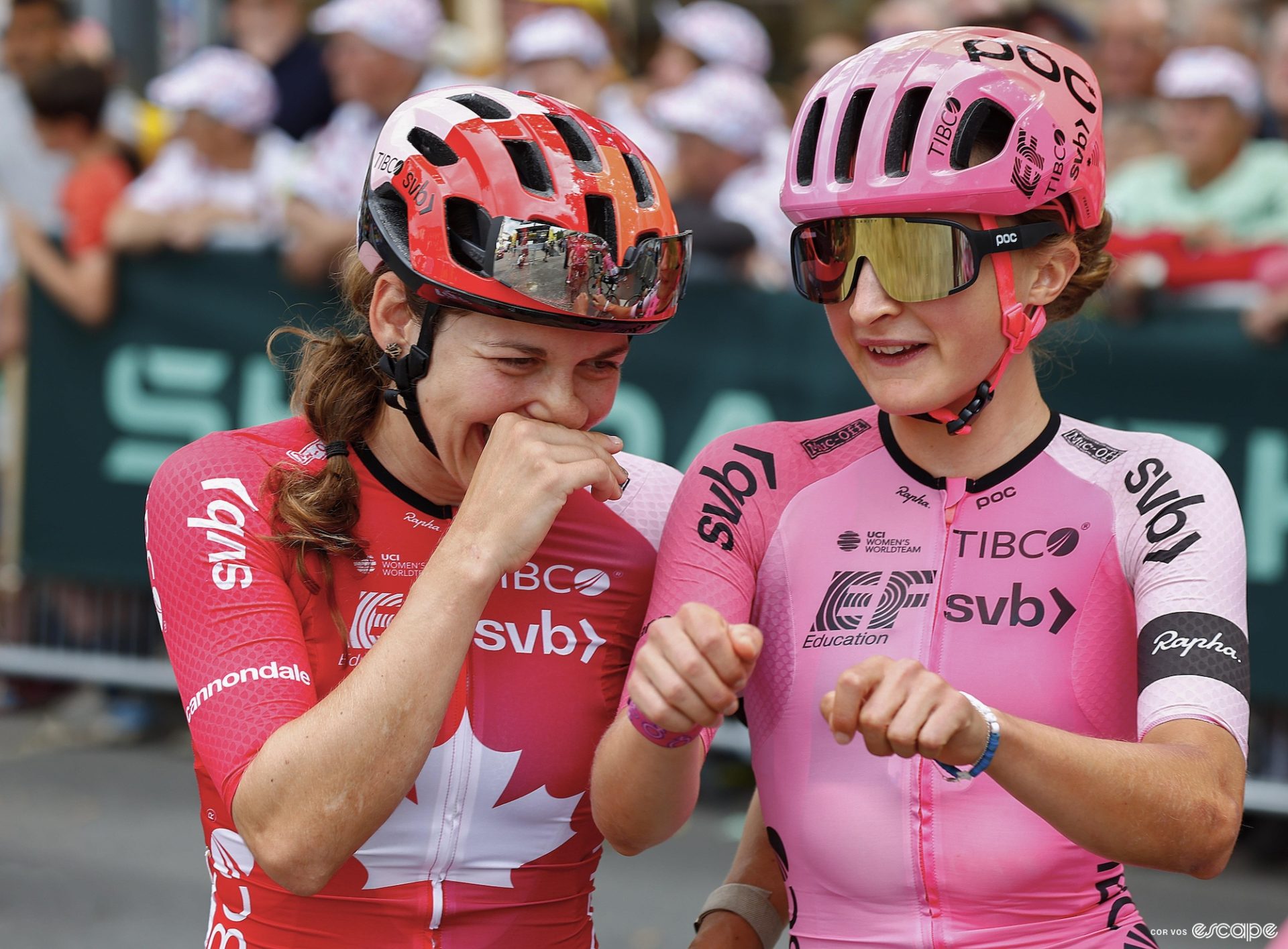
“At home, we have a maple shack,” she explained. “I’m very difficult. It needs to be my maple syrup. So I always bring it in with me. I’m always a bit scared [traveling with maple syrup]. But I wrap it in so many things to be sure.
Last time I left, in December, I brought two liters and when my dad came to visit me and brought me another liter so yeah, I have a little reserved here. I am going home in a couple of weeks and it’s lasted me the season.”
The making of maple syrup, if you’re not familiar, involves tapping maple trees, installing a tube so the sap drains down into tubs after being filtered and then it’s boiled down until it’s the kind you’re probably familiar with (not like that gross stuff they have at Waffle House; real maple syrup. Like Untapped. Although … Vallieres wouldn’t enjoy me mentioning Vermont maple syrup here, so sorry about that, Mags).
“I haven’t been in a long time because I’m already in Europe usually but we have I think 8,000 trees with tubes all going to a kind of filter, then goes into a bath and then goes into like a huge place where we boil it. There’s a section that goes hotter, hotter and then at the end when it’s the perfect temperature it goes down so we put the cans.”
It took three liters, but by the end of the season Vallieres still hadn’t run out of maple syrup from home, and a good thing too, as the season was long; Vallieres started racing in early February and didn’t finish her last event – the Tour de l’Avenire Femmes – until September 1. She couldn’t return to Canada for nationals because she wanted to focus on the Giro, a race she had done the year before already. She spent a massive chunk of time training at altitude before the Italian race with her teammate Letizia Borghesi.
“It was my first time doing altitude this year and I really liked it. Actually. I thought I was gonna die when I came there because everyone was telling me, ‘You’re gonna suffer so much.’ And I suffered, but I had it in my head that I was I was gonna suffer so so much that it was fine.”
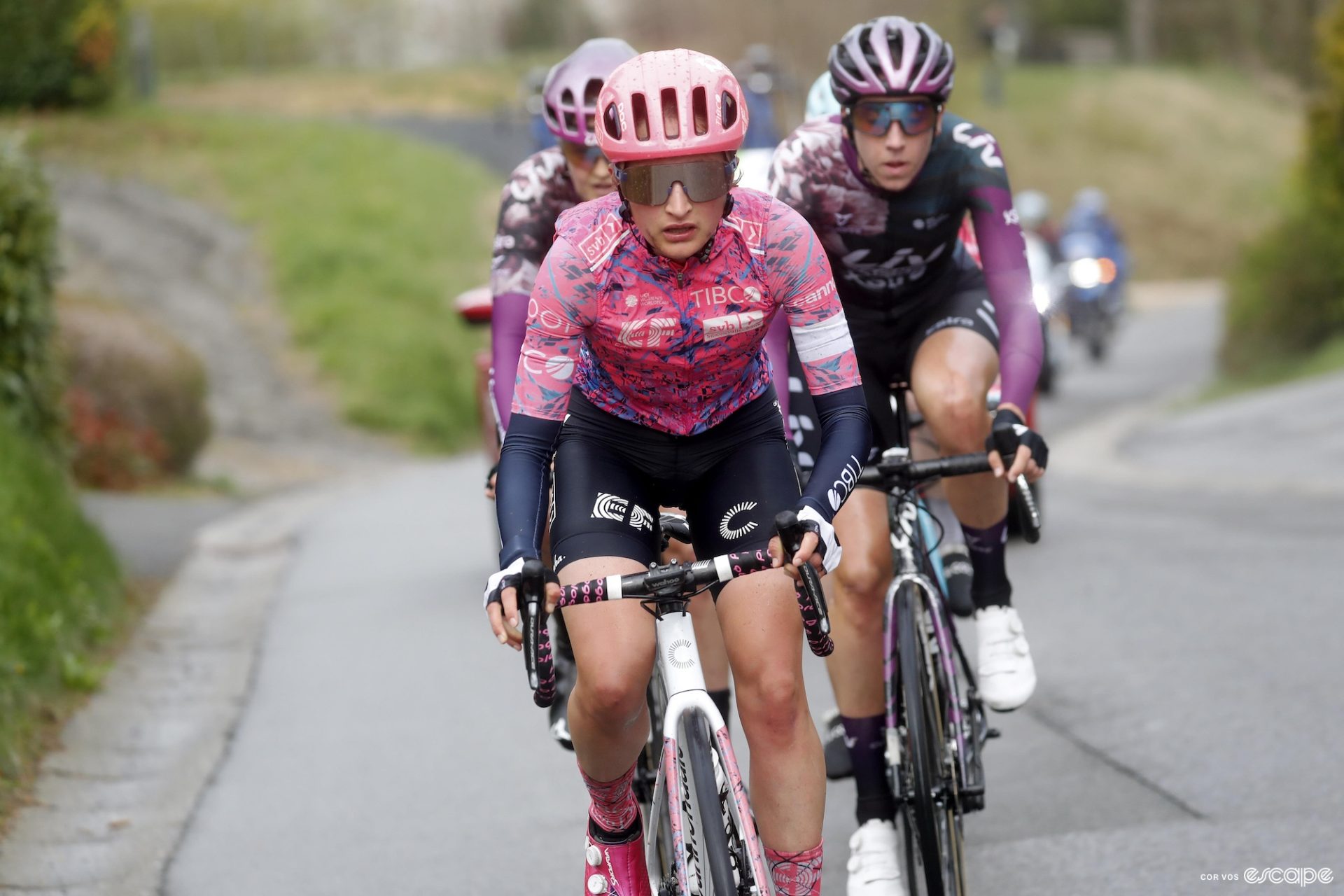
After the training block Vallieres completed the Giro/Tour double in support of Veronica Ewers, the second time she did the two races back to back.
“We also had some bad luck [this year] with Veronica crashing and breaking her collarbone. So it made it also harder, trying to find another focus after stage 6.”
The team refocused after Ewers was forced to leave, and when it came to the queen stage, stage 7, they were possibly the most active team before the climbing truly kicked. The sent rider after rider off the front, because Ewers had been their best option for that stage.
“We were like, ‘Well, what are we gonna do today?’ So we just try to attack until we get to the Col d’Aspin, we attacked, attacked, attacked, try to do something because, yeah, I mean, she was our best option for the long climbs,” Vallieres said of the seventh stage.
But the Tour this year was a bit of a perspective-shifting race for Vallieres. As a domestique she doesn’t get many opportunities to go for her own results. This Tour was different, with breakaways stealing the show on more than one occasion.
“At the Tour, it was very different racing, because normally, the break never gets to the end. It’s so rare,” she said. “And there were a couple of stages that the break got to the finish. It also gives you a bit of a hope like ‘Oh, yeah, this can happen,’ and you want to try even more because you know that it’s actually possible.”
Not only did Vallieres get a taste of different racing at the Tour this year, she also learned a thing or two about the quick turnaround between the Giro to the Tour.
“Last year I didn’t recover well. So then I learned from last year to this year, to really go super easy in between and after also. I feel like the Giro really helped me also because I feel like I’m still new. So I still learn every race a lot. So, like doing them back to back, I can bring a lot into the Tour afterwards.”
And she is new. She’s only been in the WorldTour for two years. It’s easy to forget this, since she’s been living in Europe on her own for four years, but she’s only 22 years old, she still has a lot to learn about herself on and off the bike.
The two years spent with EF Education-TIBCO-SVB solidified her as one of the riders EF Education-Cannondale would pick up for its inaugural 2024 season. Contrary to the team name, the two teams are different, but thankfully for Vallieres, she won’t be losing that Canadian, family feel.
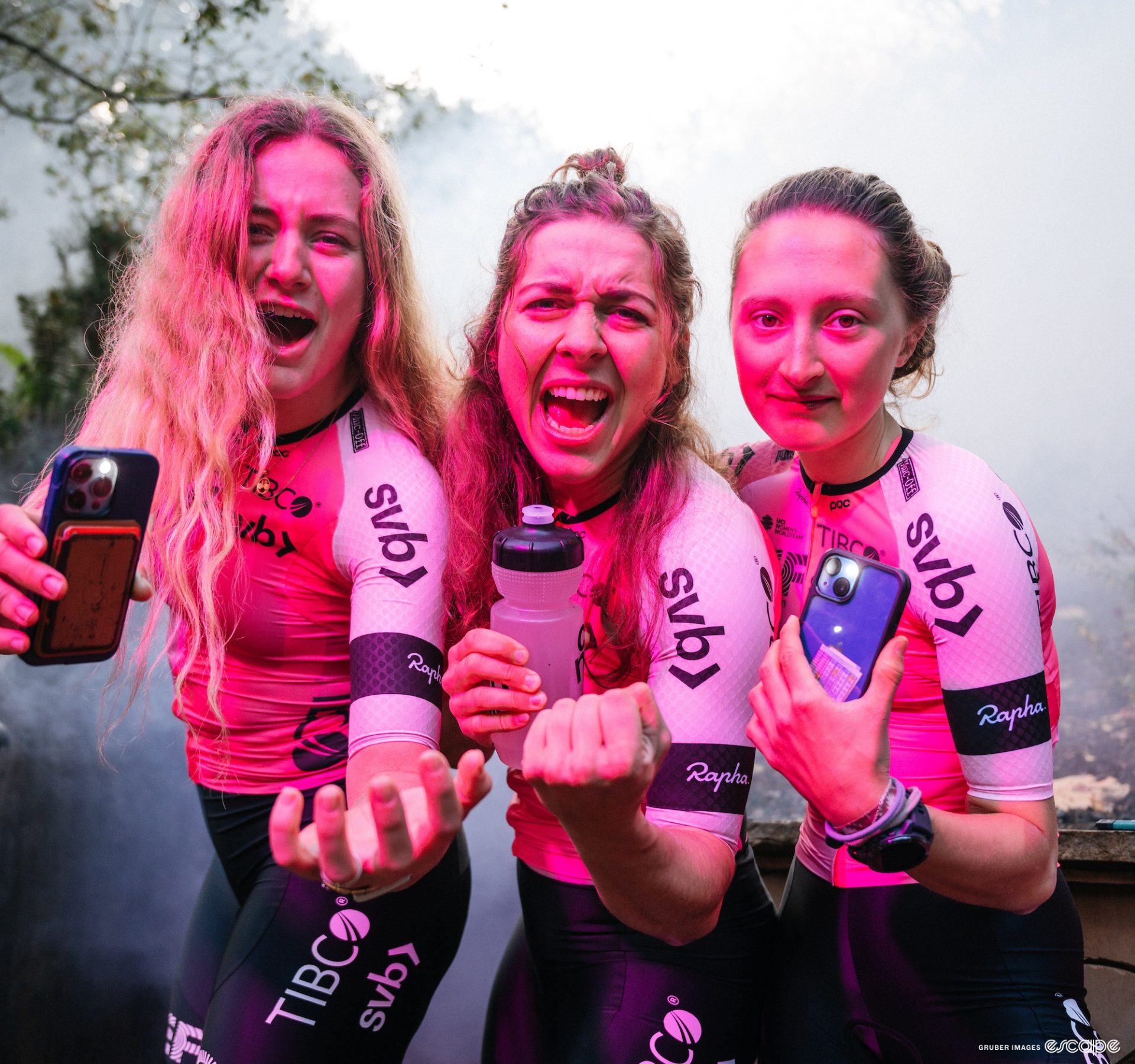
“It’s a lot of new riders, but there were a couple that are staying which is nice to continue working with the same girls. You get really used to riding with some people and you know what they are like.
I’ve been riding with them for two years now, I know what they like in the peloton. I know how I can help.” There’s also still a strong Canadian presence, with Vallieres and Jackson joined by Clara Emond.
For the 2024 season Vallieres and her EF Education-Cannondale teammates will be out of the WorldTour, as the new team will have to start in the Continental ranks and work their way up to the top, but it’s a team stacked with talent, and will be run as if it’s a WorldTour program.
“I love what the men’s side is doing with like Lachlan [Morton], and having a little bit more adventure thrown in as well. I feel like it makes the team more approachable from a fan perspective.”
Vallieres plans to continue learning with her new team, but hopefully, someday, when she’s ready, she will get a crack at the Ardennes Classics.
What did you think of this story?
